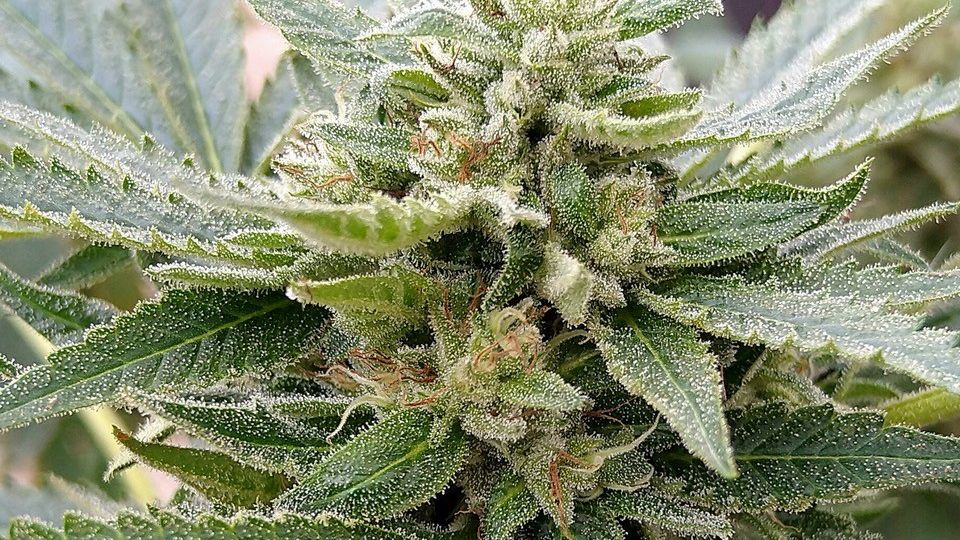How to Grow Cannabis for Rare Cannabinoids

A high THCV and CBG cannabis variety. Photo courtesy of Joshua Turner/Yellowhammer Genetics.
Commercial cannabis cultivators that service medical or adult-use cannabis markets grow their crops for two types of active ingredients: cannabinoids and terpenes.
The most common cannabinoids are tetrahydrocannabinol (THC) and cannabidiol (CBD).
THC is responsible — in part — for the psychoactive experience associated with cannabis consumption, and research is confirming it offers a plethora of medicinal benefits as well.
CBD is a non-psychoactive compound found in cannabis that is believed to hold health benefits for the consumer and is increasingly being infused into everything from drinks to sunscreen.
Terpenes are naturally occurring compounds within cannabis that influence the plant’s distinct aroma and taste profile.
However, a fourth group of compounds — minor cannabinoids — are slowly entering the lexicon of commercial cannabis cultivators. THCV, CBG, CBN, and CBC are just a few of the rare cannabis compounds that are capturing interest across the industry. Researchers are discovering that although these cannabinoids typically appear in lesser quantities than THC and CBD, they hold great potential for both human health and the grower’s profitability.
As researchers uncover more links between rare cannabinoids and human health, growers wanting to differentiate their offerings and boost their bottom line may want to consider growing varieties to service this expanding new market.
If you’re looking to explore the potential benefits of growing and selling cannabis flower with unique cannabinoids, set yourself up for success with these six cultivation tips.
Select Varieties Bred for Rare Cannabinoids
Rare cannabinoids are often referred to as “minor” cannabinoids because they are typically found in low quantities in most of today’s popular varieties. Cultivating crops with negligible amounts of these compounds won’t help establish your company as a premier grower of rare cannabinoids. Instead, select varieties explicitly bred for increased levels of these unique compounds. Yellowhammer Genetics is a seed company that will be releasing varieties bred specifically for rare cannabinoids starting in 2024.
Don’t Reinvent the Wheel
Whether you purchase seeds, rooted cuttings, or plantlets propagated by a tissue culture lab, try to glean as much cultivation information as possible from the breeder or vendor of these unique varieties. In traditional horticulture, breeders and plant brokers are happy to provide growers with crop recommendations because they want the grower to succeed and become a return customer. Buying cannabis varieties shouldn’t be any different. Don’t reinvent the wheel by experimenting to find the best way to grow. Ask the breeder. If they aren’t willing to provide recommendations, keep shopping until you find someone who will.
Special Varieties Don’t Necessarily Require Special Conditions
Growing rare cannabinoids shouldn’t require a complete overhaul of your cultivation program. Short of any specific recommendations from the breeder, cannabis cultivated for minor cannabinoids is grown like any other cannabis variety. These plants should fit seamlessly into your existing indoor, greenhouse, or outdoor production schedule without expensive additions or retrofits. Make things easy on yourself by utilizing the same cultivation techniques, harvesting process, and post-harvest equipment you use with your other varieties.
Safely Trial Methods for Increasing Cannabinoid Production
Controlled stress is a common technique for encouraging cannabinoid production, but it needs to be approached responsibly. Some growers believe that dropping relative humidity levels or inducing drought-like conditions will force the plant to excrete more essential oils to protect itself from the elements. The more oil production, the more cannabinoids are on the plant.
Growers new to this idea should try this technique in a controlled R&D setting before applying it to the entire crop. Overly dry conditions can damage root health and compromise a plant’s ability to realize its full potential. Trial this on a small scale first, or better yet, enlist the help of crop steering technology to help you safely control targeted dry backs.
Avoid Unregistered Products That Increase Cannabinoids
Some growers have experimented with products believed to increase oil production in cannabis plants. However, there are almost no chemistries outside of organic pest control products that are approved for use on cannabis. Even if a grower manages to increase cannabinoids using an unregistered product, they risk recalls, compromised relationships with buyers, and even license revocation. Going “off-label” simply isn’t worth the risk. Don’t do it.
Be Hyper-vigilant About Harvest and Post-harvest Processes
Since rare cannabinoids reside within the plant’s oils, growers must be careful not to unintentionally damage them when harvesting or drying the crop. Rough handling and high temperatures can degrade cannabinoids to a fraction of what they are on a live plant. Outdoors and in greenhouses, schedule harvests for the early morning hours and ensure the plants are promptly moved to a climate-controlled processing room or, if you plan to extract, straight to the freezer.
Manicure the flowers by hand or utilize automated trim machines that are gentle enough to do the job without knocking off most of the oils. If you’re new to post-harvest automation, buy and trial new equipment long before you need it. Harvest day isn’t the time to dial in a new trim machine.
As cannabis normalization spreads globally, growers will increasingly look for ways to differentiate themselves and stay competitive. Cultivating for minor cannabinoids may be part of the solution. Fortunately, the recipe for success is simple. Follow the above six tips, and you may just find that minor cannabinoids are playing a major role in the success of your business.









